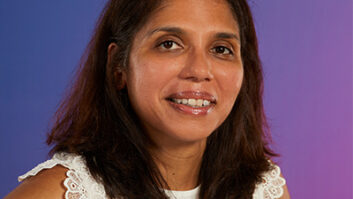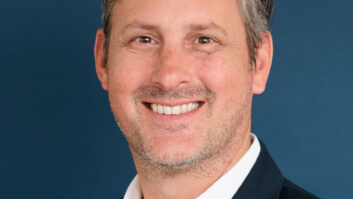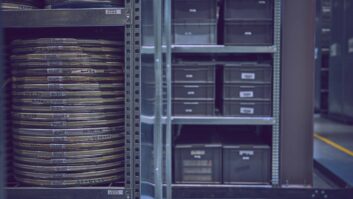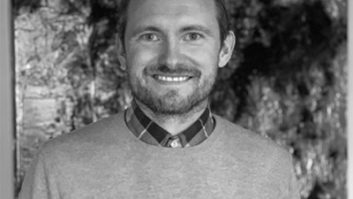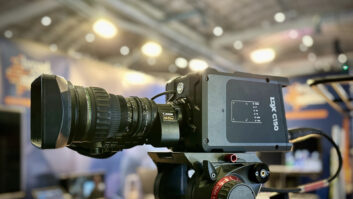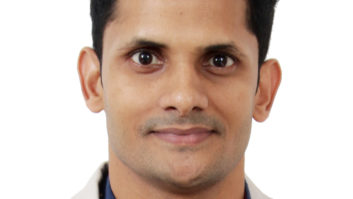Talk us through an average day in your role
The day can be anything from what I find kind of boring techy things to work out, it could be rights negotiations with an artist, it could be briefing camera people, it could be planning a shoot, it could be post production. That’s one of the reasons why I love the job, as it’s so massively varied with no two days being alike. That’s the joy of it.
How did you get started in the media industry?
When I was a kid, I went to a comprehensive school in a former mining village just south of Sunderland. Even if it had occurred to me to get some kind of job in the media, had I said it to my careers teachers, they probably would have laughed because it just wasn’t something which was on the radar. But I was very lucky in that it was a progressive comprehensive school, and the headmaster and the head of English and the head of Drama would probably say that they saw something in me that might not end up doing what the rest of my family did or what most of my peers did – working down a coal mine or on an oil rig. So I dabbled in a lot of drama and theatre and lied about my age and got a job in a big Mecca nightclub in Sunderland. I worked there four or five nights a week – it wasn’t great for my A Levels but it was great for my music.
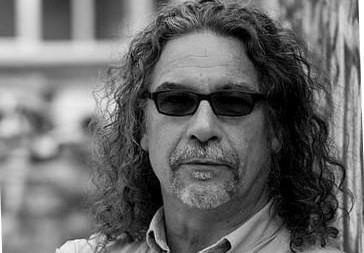
Andrea Wonfor and my former English and Drama teacher Malcolm Gerrie were working at Tyne Tees making a new music programme called All Right Now. They came down to the Mecca to do a film about a typical club night. It was a big club – we got about 2500 people in on a Saturday night. It was the height of the disco and dance boom of the late 1970s. I was asked if I was interested in auditioning for the job of presenter, and because I was a young person with a regional accent – those old-school TV systems were starting to break down, even then – I got the job. I soon realised that although I enjoyed presenting, the power and longevity was on the other side of the camera. So mid way through presenting these teenage magazine and music programmes – Check It Out and TX45 – I applied for a job as a trainee researcher. The progression was presenter-researcher-assistant producer-producer-director.
I got involved with The Tube because Malcolm Gerrie, Andrea Wonfor, Jeff Wonfor, Gavin Taylor and the team had a reputation for making music programmes – ‘young people’s programmes’ as they were known – Channel 4 came up to have a look at the facility and meet the people. Mike Bolland was the first commissioning editor to get involved before Channel 4 was on the air. Andrea Wonfor had written a proposal for 6 x 30 music discussion programmes under the w/t of Jamming. Channel 4 came back and said they didn’t like the title but we definitely want to do a music series with you, on Friday nights, live, for 1 hour 45 minutes. It ran for 26 weeks rather than six weeks.
It was a blend of youth and experience at Tyne Tees that made energetic, sexy, exciting programmes. I started as a trainee researcher. We had quite a big team on The Tube because there was a lot of air time to fill, so there were magazine items which could be comedians or performance poets or chats in the Star Bar and lots and lots of bands. My specialism was soulful hip hop/RNB so I booked acts like Grand Master Flash, Cameo and Chaka Khan, partly due to my DJing background. My other love was bands like The Clash and The Cure. My taste was anything that wasn’t bland.
What I became a specialist in was big live events, so the first outside broadcast we did was Queen at the Milton Keynes Bowl. Then we did U2 and others at Gateshead Stadium, Dire Straits at Wembley; we had a crew down at Live Aid; Eric Clapton, Phil Collins at Birmingham NEC, Spandau Ballet, a lot of big, single artist type shows which reflected the liveness of The Tube. So I was trained and schooled in putting live music on television. I left before the series finished, in 1987, because I was moving on to set up the next thing to replace The Tube, which started with Island Records’ 25th anniversary show. Then we did a series called Wired which was kind of an overreaction against The Tube in that we tried to make it slicker and smoother. I was the live music producer on Wired, which became my speciality. I started to direct mainly because I was sick of things not really looking the way I wanted them to look and not executed in the way I wanted them to happen. I suppose to this day I’m still basically doing that.
What training did you have before entering the industry?
I’m not a great example to hold up for educationalists or training officers because I have, to this day, no formal TV training. I started working in TV instead of going to university and getting a degree so all my years of training amounts to zero, officially. It’s always been on-the-job training – I was very lucky to start as a presenter because that meant you had a lot of spare time and you could watch film edits. You’d learn how it’s done, in a short space of time.
Why do you enjoy working in the industry?
Various reasons. I get very bored with routine so I like the sense of adventure. Also, coming from a little mining village and being the first in my family not to go down a coal mine. It’s a fantastic kind of job – like being paid for a hobby. I’m like a conduit between talented people and their audiences. I’m interpreting someone’s art for mass consumption and that’s a big responsibility on both sides.
What piece of advice would you offer someone looking to explore a role similar to yours?
Mostly the process of making television programmes is a lot of common sense and discipline, rather than obsessively learning how television works. It’s more important to know your subject. I bring an expert knowledge and enthusiasm of music and how to adapt television to music – not the other way around. It’s most important to have a knowledge of your subject.

